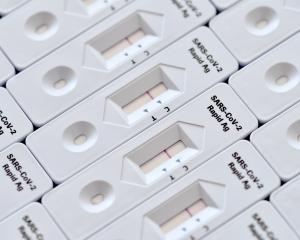
Cabinet is due to meet today to decide on any lockdown extensions, or lowering alert levels for parts of the country.
Dunedin School of Medicine consultant psychiatrist and senior lecturer Dr Chris Gale said, according to survey studies carried out last year, people experienced increased anxiety and low mood during lockdown.
"We know the weaker your social network, the worse your general mental heath is, and the worse your physical heath is."
For some people, sitting at home, reading and researching, was their idea of "heaven", he said.
But everyone needed a certain amount of social contact to maintain a healthy mental health.
The uncertainty that came with going in and out of lockdown could also take its toll.
The longer the lockdown, the less likely people were to use adaptive ways of coping, instead opting for maladaptive coping mechanisms, he said.
That could include substance abuse, aggression, and moving into a state of anxiety, fear and despair.
However, there were steps people could take to look after themselves and others during the unprecedented times.
Those who could, should avoid being by themselves, Dr Gale said.
"I am very aware that there are some people who have no choice. But if you have a choice, make your bubble a little bit bigger.
"Having someone else to talk to, who you trust, is fantastic."
As was having contact with people in a way that provided as much interaction as possible, he said.
"Video-conferencing, like FaceTime or messenger, beats phone calls. Phone calls beat emails. Emails beat texts, and texts are better than nothing."
Those living alone needed to have some form of human contact regularly, he said.
"That means that for some, regular visits to their pharmacist, or their [supermarket] will be needed to avoid isolation, loneliness and despair."
Dr Gale said deliberately scheduling exercise, and getting creative about what that exercise looked like, was also important.
He warned that over-consumption of media would not do any favours for people’s mental health, and he did not recommend people plan their day around the Government’s Covid-19 updates.
"Do not spend all your time on social media looking at the pretty pictures of people overseas having fun. That will drive you into a terrible state.
"You control what you can control."
Dr Gale said while there were many mechanisms people could use to avoid their mental health slipping, "sitting down in the morning with a piece of paper, making a list of things you can do today, and ticking them off as you go" was as good as any.
On the other hand, those able to work from home were generally kept busy.
But Zoom and team meetings could be fatiguing, he said.
"You need screen time for a bit, and then you need to go outside, walk, stretch, make a cup of coffee.
"There is a tendency here for people to just work and then go on to a Zoom meeting.
"I don’t think we can expect the same level of team productivity [in lockdown]."
For those who had children and partners at home, it was good to try to work from a separate room where possible, Dr Gale said.
"But if not, the humans you are around have got to take priority."
Stay mentally fit
Dr Chris Gale’s tips for prioritising mental health during lockdown:
• Avoid being alone, where possible.
• For those living alone, more regular trips to the supermarket may be necessary for human contact.
• Opt for more interactive communication forms like video calls, over phone calls, emails or texts.
• Schedule exercise and get creative with workouts.
• Avoid over-consumption of media and social media.
• Do not plan your day around Covid-19 announcements.
• Write daily to-do lists.
• Take regular breaks if working from home.
• Accept that work productivity may drop.
• Work in a separate room from partners and/or children, where possible.
Advertisement













